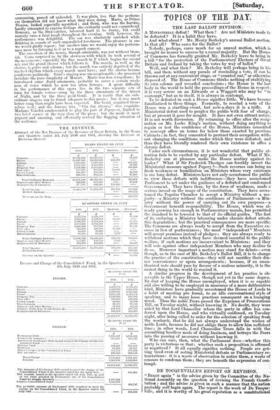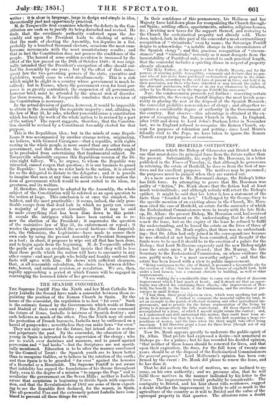DE TOCQITEVILLE'S REPORT ON WrISION. " BEGIN again " is the
advice given by the Committee of the Na. tional Assembly on the question of revising the French Consti- tution ; and the advice is given in such a manner that the, nation probably will begin again. The report is the work of De Tocque- vine, and it is worthy of his great reputation as a constitutional
writer : it' °leg in language, large in Osigri and siaiple in idea, theoreticall# jest and oPportanely practical. t ; M. de Tocqueville first examines whether the defects in the Con- stitution are such as to justify its being disturbed and revised. He finds, that the coordinate authority conferred upon the As- sembly and upon the President leads to clashing of action ; that the mode of electing the Assembly, ten deputies in a list, probably by a hundred thousand electors, occasions the most cum- bersome movements with the most unsatisfactory results ; and that in fact the Constitution does not possess the confidence of the people. The hazard of some sudden revulsion is increased by the effect of the law passed on the 28th of October 1848: it was origi- nally intended that the President's occupation of office should out- last the Assembly by one year; but by the effect of that subse- quent law the two governing powers of the state, executive and legislative, would cease to exist simultaneously. This is a risk which might be slight in a country whose government is much lo- calized; but in France, where the government even for local pur- poses is so greatly centralized, the suspension of all government, however brief, must be attended by the utmost risk of disorder. For these reasons, M. de Tocqueville concludes that a revision of the Constitution is necessary.
In the actual division of parties, however, it would be impossible to obtain in the Assembly the requisite majority ; and, alluding to the law of May 31, he asks, whether you could cause a constitution which has been the work of !the whole nation to be revised by a part of the nation? The report suggests, therefore, that the Constitu- tion should be revised by a Constituent Assembly elected for that purpose.
This is the Republican idea ; but in the minds of some Repub- R i eams it was accompanied by another strange notion, originating, we believe, with General Cavaignac—that a republic, with rights vesting in the whole people, is more sacred than any other form of government, and that therefore the Constituent Assembly ought to be precluded from entertaining that fundamental subject. De Toequeville admirably exposes this Republican version of the Di- vine-right fallacy. We, he argues, to whom the Republic was intrusted, cannot reopen that question ; it is our business to guard the Republic : but when we refer back to the nation, it is absurd for us the delegated to dictate to the delegates ; and it is puerile to imagine that men at any time can dictate to a future nation the form of government which would be most suited to its ideas, its greatness, and its welfare.
If, therefore, this report be adopted by the Assembly, the whole subject of the Constitution will be referred as an open question to the nation at large. This conclusion is at once the simplest, the boldest, and the most practicable : it seems, indeed, the only prac- ticable escape from that dead lock in which no party can secure a majority of the present Assembly. But it may be said to undo everything that has been done down to this point : it annuls the intrigues which have been carried on to re- new the election of the President ; it supersedes the question of the restrictive law of May 31, its enforcement or repeal ; it wastes the preparations which the several factions—the Imperial- ists, the Orleanists, the Legitimists—have made to secure their own ends by using the present Assembly or President Bonaparte as a tool; in short, it proposes to wipe out all that has been done, and to begin again from the beginning. M. de Toequeville admits the perils, of such an evolution, but insists that they will be less than those perils which the nation will have to encounter in any other course : and most people who boldly and frankly confront the !Vets will agree with him. He shows with sufficient clearness, Oat, in all reasonable calculation, the choice lies between delibe- rate, honest; and-rational revision, or revolution. We are, then, rapidly approaching a period at which France will be engaged in rearranging the loosened fabric of her government.



























 Previous page
Previous page